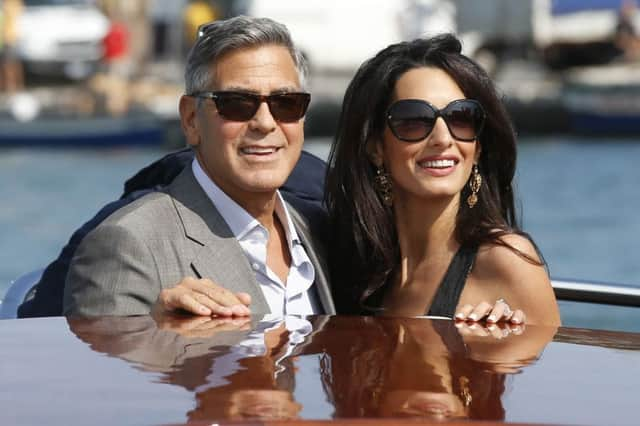Older men who want to go from here to paternity


At the age of 56, Clooney is by no means in the first flush of youth, but the silver-haired film star is a mere whippersnapper compared to some other older celebrity dads.
Charlie Chaplin’s legendary loins bore fruit at 73. Other well-known celebrity fathers include: Des O’Connor (at 72), Sir Paul McCartney (at 61), Rupert Murdoch (at 72), The Rolling Stones’ Mick Jagger (at 73 and his eighth child) and Ronnie Wood (twins at 69).
Advertisement
Hide AdAdvertisement
Hide AdBut the daddio of them all is Ramjit Raghav, an Indian former wrestler and farmer who has been claimed by various news media as the world’s oldest father. He resided in southern India with his wife and claimed to have had his first child with his wife at age 94. He fathered a second child at age 96.
Raghav is a strict vegetarian, living predominantly on milk, almonds, and butter, and credits vegetarianism for his longevity and clean bill of health. He was quoted as saying: ‘‘I have been a vegetarian all my life, and I credit my stamina and virility to my diet of vegetables and grains. Being a vegetarian is the secret to my strength and good health.’’
Meanwhile, the Guinness World Records lists the oldest father ever as Australian Les Colley (1898-1998), who fathered his ninth child at age 92 with a Fijian woman he met through a dating agency.
‘‘I never thought she would get pregnant so easy, but she bloody well did, ‘‘ he told newspapers at the time.
Advertisement
Hide AdAdvertisement
Hide AdAfter contracting a brief bout of pneumonia in 1998, Colley died, just four months short of his 100th birthday.
First time 90-year-old dads are, however, a rare occurrence. The average age of fathering a child is 33.
However, figures from the Northern Ireland Statistics and Research Agency show that in 2015, 2,796 babies were born to men in the 40-49 bracket, 205 were born to men aged 50-59 and 13 babies were born to men over 60.
But whether they are becoming fathers for the first time, or already have children, these doting older dads all say much the same thing; that the new baby brings them a new lease of life.
Advertisement
Hide AdAdvertisement
Hide AdTheir advanced age allows them more time and patience and more financial stability to enjoy the infancy as it unfolds before them.
But what about the conspicuous drawbacks, such as when dad is mistaken for grandad, or not being quite fit enough to play keepy-uppy in the park, not quite with-it enough to understand the dreadful racket this new generation calls music and not quite tech savvy enough to help fix the iPad?
Then there are the physical and mental risks associated with fathering offspring later in lfe.
Research reveals that compared to younger dads, fathers in the older age group were more inclined to be less tolerant of their children’s physical activities, perceiving them to be more impulsive and overactive.
Advertisement
Hide AdAdvertisement
Hide AdOlder dads apparently also show less affection and warmth towards their offspring.
In terms of physical health, there are increased risks of epilepsy, autism and breast cancer in the offspring of older fathers.
The risk of miscarriage and premature birth also rises when the man is more than 40.
Advanced paternal age (over 40) increases the risk of breast cancer in their daughters by around 60 per cent, according to one study American researchers looked at (one of five to find a link between advanced paternal age and breast cancer).
Advertisement
Hide AdAdvertisement
Hide AdChildren conceived by fathers over 40 also have a 30 per cent increased risk of epilepsy, a 37 per cent higher risk of Down’s syndrome, a 14 per cent greater chance of childhood leukaemia, and a 70 per cent greater likelihood of central nervous system cancers (such as brain tumours).
If the father is over 45, there is a threefold increased risk of retinoblastoma, a rare type of eye cancer. Older fathers are thought to be at higher risk of having children with autism and schizophrenia.
Some of the biggest increases in risk are seen in genetic disorders. Achondroplasia, a common cause of dwarfism, is nearly eight times more prevalent in the children of fathers aged 50 and over.
Then there is the issue that the child may be forced to deal with sickness, disability, infirmity or, indeed bereavement at an age when most young people have neither the maturity nor the understanding to cope with a parental death.
Advertisement
Hide AdAdvertisement
Hide AdI speak from experience. My own father was 51 when I was born - my mother was 34. All my friends’ fathers were younger - and, generally, sprightlier but I wouldn’t have wished him different.
There is, of course, one unavoidable disadvantage to the older father.
He is less likely to reach certain milestones in his children’s lives, whether that be their graduations, marriages or the arrival of the first grandchild.
In my case, my father died aged 74, when I was a 23-year-old. It broke my heart. I wish he could have been around for longer, especially to meet his grandchildren, Maria and Hugh (whom I named after him and is his double).
But then, there’s never a good age for your father to die.